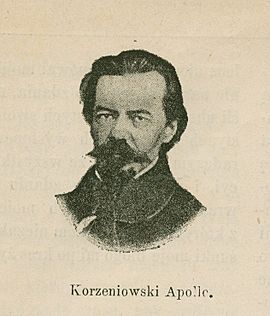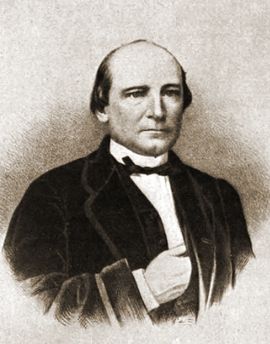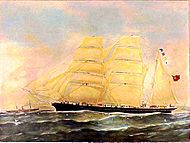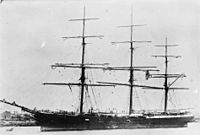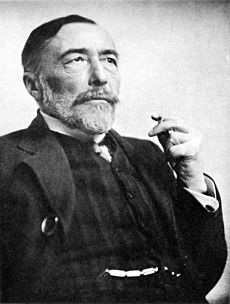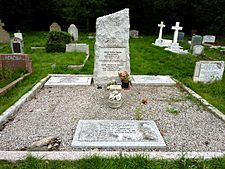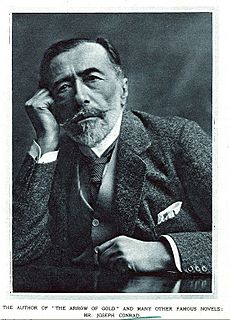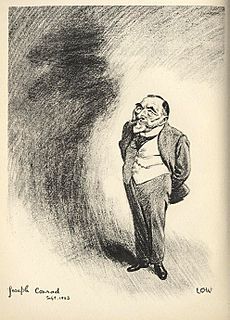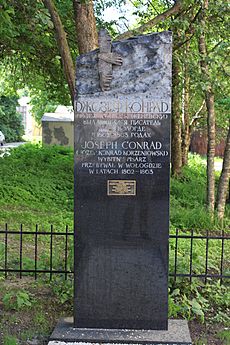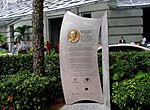Joseph Conrad facts for kids
Quick facts for kids
Joseph Conrad
|
|
|---|---|
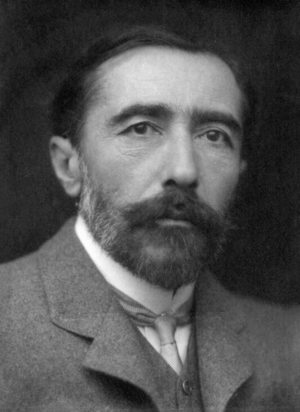
Conrad in 1904 by George Charles Beresford
|
|
| Born | Józef Teodor Konrad Korzeniowski 3 December 1857 Berdychiv, Russian Empire |
| Died | 3 August 1924 (aged 66) Bishopsbourne, Kent, England |
| Resting place | Canterbury Cemetery, Canterbury |
| Occupation | Novelist, short-story writer, essayist |
| Nationality | Polish–British |
| Period | 1895–1923 |
| Genre | Fiction |
| Literary movement |
|
| Spouse |
Jessie George
(m. 1896) |
| Children | 2 |
| Signature | |
 |
|
Joseph Conrad (born Józef Teodor Konrad Korzeniowski on December 3, 1857 – August 3, 1924) was a famous Polish-British writer. He wrote many novels and short stories. Even though he didn't speak English well until he was in his twenties, he became one of the greatest writers in the English language.
Many of his stories are set on ships and at sea. They often show people facing tough challenges in a world that can seem uncaring. Many movies have been made from his books. People also say that his stories, written in the early 1900s, seemed to predict future world events.
Conrad lived when the British Empire was very powerful. He used his experiences from his home country, Poland, which was divided among three empires. He also used his time working on French and British merchant ships. This helped him write stories about a world shaped by European power, including imperialism (when one country controls another) and colonialism (when people from one country settle in another).
Contents
Conrad's Early Life
Joseph Conrad was born on December 3, 1857, in Berdychiv, which is now in Ukraine. At that time, it was part of the Russian Empire. He was the only child of Apollo Korzeniowski, who was a writer and political activist. His mother was Ewa Bobrowska.
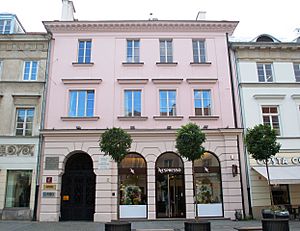
Because his father was involved in politics, the family moved often. In 1861, they moved to Warsaw. There, Apollo joined a group fighting against the Russian Empire. He was arrested and put in prison. In 1862, Apollo and his family were sent away to Vologda, a cold place in Russia. In 1863, they were allowed to move to Chernihiv in Ukraine, where conditions were better. Sadly, in 1865, Conrad's mother, Ewa, died from tuberculosis.
Conrad's father taught him at home. Young Conrad read books that shaped his future. He read Victor Hugo's Toilers of the Sea, which made him interested in life at sea. He also read Shakespeare, which introduced him to English literature. He especially loved Polish Romantic poetry.
On May 23, 1869, Apollo Korzeniowski died from tuberculosis. Conrad was only eleven years old and became an orphan.
Conrad was then cared for by his mother's brother, Tadeusz Bobrowski. Conrad's health was not always good, and his schoolwork was not great. His uncle had to spend a lot of money on him. Conrad wasn't a good student, but he was very good at geography. He probably had private teachers and didn't go to a regular school much. In 1871, when he was thirteen, Conrad announced he wanted to become a sailor.
In 1874, his uncle sent the sixteen-year-old Conrad to Marseilles, France. This was so he could start a career in the French merchant navy. His uncle also gave him money each month. Even though Conrad didn't finish high school, he could speak French very well. He also knew some Latin, German, and Greek. He was well-read, especially in Polish Romantic books.
Life as a Sailor
After almost four years in France and on French ships, Conrad joined the British merchant navy in April 1878. He likely started learning English just before this.
For the next fifteen years, he worked on British ships. He started as a crew member, then became a mate (an officer who helps the captain), and finally a captain. In total, he spent over eight years at sea. He was a captain only once, from 1888 to 1889, when he commanded the ship Otago from Sydney to Mauritius.
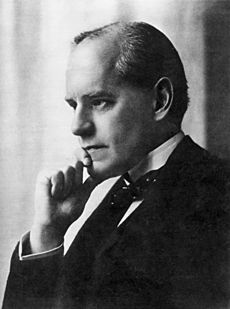
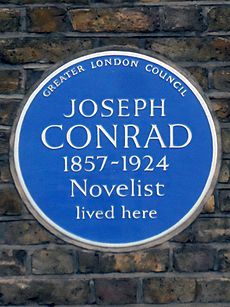
In 1890, Conrad visited Poland again to see his uncle and other family members. This trip happened while he was waiting to go to the Congo Free State. He had been hired by a Belgian company to work on the Congo River. His experiences in the Congo later inspired his famous story, Heart of Darkness.
Conrad finished his last long sea journey as a sailor on July 26, 1893.
Becoming a Writer
In 1894, when he was 36, Conrad decided to stop working at sea. This was partly because of his health and because it was hard to find ships to work on. But mostly, he loved writing so much that he decided to become a full-time writer. His first novel, Almayer's Folly, was published in 1895. It was set in Borneo. This was the first time he used the pen name "Joseph Conrad."
Almayer's Folly and his next book, An Outcast of the Islands (1896), made people see Conrad as a writer of exciting, exotic stories.
Most of Conrad's writings were first printed in newspapers and magazines. He also wrote for The Outlook, a weekly magazine, from 1898 to 1906.
It took a long time for Conrad to earn enough money from his writing. He often asked publishers for money in advance or borrowed from friends like John Galsworthy. In 1910, the government gave him a yearly grant of £100, which helped with his money worries. Later, people started buying his original handwritten stories. Even though smart people in England recognized his talent early on, he didn't become widely popular until his book Chance was published in 1913.
Conrad's Personal Life
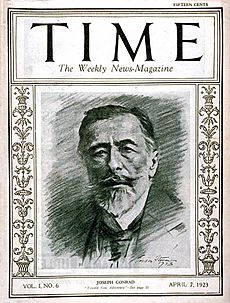
Conrad had health problems throughout his life, both physical and mental. In 1891, he was in the hospital for several months. He suffered from gout, nerve pains in his arm, and often got malaria. He also said his hands were swollen, which made writing hard. Conrad was very afraid of dentistry, so he didn't take care of his teeth until they all had to be pulled out. He once joked that every novel he wrote cost him a tooth!
Marriage and Family
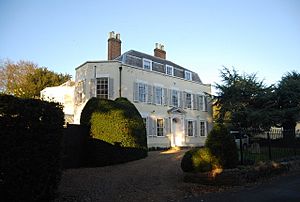
On March 24, 1896, Conrad married an Englishwoman named Jessie George. They had two sons, Borys and John.
The family rented many different homes, mostly in the English countryside.
Except for a few trips to France and Italy, a vacation to his home country of Poland in 1914, and a visit to the United States in 1923, Conrad lived the rest of his life in England.
Conrad's Death
On August 3, 1924, Joseph Conrad died at his house in Bishopsbourne, Kent, England. He likely had a heart attack. He was buried at Canterbury Cemetery. On his gravestone, his original Polish name was misspelled as "Joseph Teador Conrad Korzeniowski." The gravestone also has lines from a poem by Edmund Spenser that Conrad chose for his last complete novel:
Sleep after toyle, port after stormie seas,
Ease after warre, death after life, doth greatly please
Conrad's wife, Jessie, died twelve years later in 1936 and was buried with him. In 1996, his grave was named a Grade II listed structure, meaning it's an important historical site.
Conrad's Writing Style
Themes and Language
Conrad often wrote about life at sea and in faraway places. He didn't write much about everyday life in Britain because he didn't know much about it.
Conrad used his own memories and experiences a lot in his stories. This makes readers feel like his life and his books are closely connected. His ideas about the world are often explained by looking at what he said in private, in letters, and in his books.
Many of Conrad's characters were based on real people he had met.
Besides his own experiences, some parts of his stories were inspired by real events or other books. For example, the first part of his 1900 novel Lord Jim was inspired by a real ship story from 1880. The second part was partly inspired by the life of James Brooke, a famous adventurer.
In Nostromo (finished in 1904), the idea of stealing a lot of silver came from a story Conrad heard and later read in an old book.
Conrad could describe the ocean, the Malay Archipelago (a group of islands), and South America so well because he had seen these places himself.
Conrad spoke his native Polish and French perfectly from childhood. He only learned English when he was in his twenties. He probably knew some Ukrainian as a child and certainly had some knowledge of German and Russian.
However, Conrad chose to write his stories in English. He said that writing in English felt "natural" to him. Some experts believe that his English writing style was influenced by Polish and French, making it unique.
Becoming a British Citizen
Conrad was born in the part of Poland that was controlled by Russia. So, he was a Russian subject. After his father died, his uncle tried to get him Austrian citizenship, but it didn't work. This was probably because Conrad didn't have permission from Russia to live abroad permanently. He couldn't go back to Ukraine (in the Russian Empire) because he might have had to serve many years in the military. Also, as the son of political exiles, he would have faced problems.
In 1877, Conrad's uncle talked about him becoming a citizen of another country. He didn't want Conrad to become French because of the required military service. He thought about Switzerland or even the United States.
Eventually, Conrad made his home in England. On July 2, 1886, he applied to become a British citizen, and it was granted on August 19, 1886. But even after becoming a British subject, he was still considered a Russian subject. To be completely free from Russian rule, he had to visit the Russian Embassy in London many times. He later wrote about the Embassy in his novel The Secret Agent. Finally, in 1889, the Russian government officially released him from being a Russian subject.
Memorials and Tributes
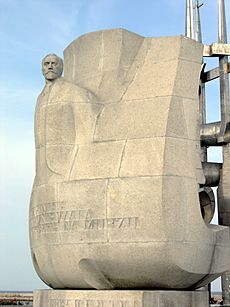
There is an anchor-shaped monument to Conrad in Gdynia, on Poland's Baltic Sea coast. It has a quote from him in Polish: "Nic tak nie nęci, nie rozczarowuje i nie zniewala, jak życie na morzu" which means, "There is nothing more enticing, disenchanting, and enslaving than the life at sea."
In Circular Quay, Sydney, Australia, there is a plaque in a "writers walk" that remembers Conrad's visits to Australia between 1879 and 1892. The plaque says that "Many of his works reflect his 'affection for that young continent.'"
In San Francisco, USA, a small triangular park was named "Joseph Conrad Square" in 1979. This was done around the time Francis Ford Coppola's movie Apocalypse Now (inspired by Conrad's Heart of Darkness) was released. Conrad himself never visited San Francisco.
During World War II, a British navy ship, HMS Danae, was renamed ORP Conrad and became part of the Polish Navy.
Many hotels in the Far East claim that Conrad stayed there as an honored guest, but there is no real proof. For example, Singapore's Raffles Hotel says he stayed there, but he actually stayed at the Sailors' Home nearby. His visit to Bangkok is also remembered, and The Oriental Hotel claims he stayed there, but he actually stayed on his ship, the Otago.
A plaque remembering "Joseph Conrad–Korzeniowski" has been put up near Singapore's Fullerton Hotel.
Conrad is also said to have stayed at Hong Kong's Peninsula Hotel, but he never actually visited that port. Later writers, like Graham Greene, followed in his footsteps and sometimes asked for the same room, helping to spread these stories that aren't true.
In April 2013, a monument to Conrad was put up in the Russian town of Vologda, where he and his parents lived in exile. However, the monument was removed in June 2016 for unclear reasons.
Conrad's Legacy
After his book Chance was published in 1913, Joseph Conrad became one of the most talked-about and praised English writers of his time. He was good at making friends, and his group of friends included many famous authors and artists. Some of these were Henry James, John Galsworthy, Stephen Crane, H. G. Wells, and George Bernard Shaw. In the early 1900s, Conrad also wrote some novels with Ford Madox Ford.
In 1919 and 1922, Conrad's growing fame in Europe made him hope for a Nobel Prize in Literature. It seemed that French and Swedish people, not English, supported him for the prize.
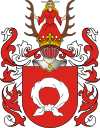
In April 1924, Conrad was offered a knighthood by the British Prime Minister. Conrad came from a Polish noble family and had a coat-of-arms. But he turned down the knighthood. He generally kept his distance from official things and didn't seem to like public honors. He had already refused honorary degrees from several universities.
In Poland, during the time of the Polish People's Republic, Conrad's books were published openly. However, his book Under Western Eyes was only published secretly in the 1980s.
Conrad's way of telling stories and his characters, who are often not perfect heroes, have influenced many writers. These include T. S. Eliot, F. Scott Fitzgerald, Ernest Hemingway, Graham Greene, and Salman Rushdie. Many movies have also been made from or inspired by Conrad's works.
Conrad's Works
Novels
- Almayer's Folly (1895)
- An Outcast of the Islands (1896)
- The ... of the 'Narcissus' (1897)
- Heart of Darkness (1899)
- Lord Jim (1900)
- The Inheritors (with Ford Madox Ford) (1901)
- Typhoon (1902)
- The End of the Tether (1902)
- Romance (with Ford Madox Ford, 1903)
- Nostromo (1904)
- The Secret Agent (1907)
- Under Western Eyes (1911)
- Chance (1913)
- Victory (1915)
- The Shadow Line (1917)
- The Arrow of Gold (1919)
- The Rescue (1920)
- The Nature of a Crime (1923, with Ford Madox Ford)
- The Rover (1923)
- Suspense (1925; unfinished, published after his death)
Short Stories
- "The Black Mate" (written 1886, published 1908)
- "The Idiots" (1896)
- "The Lagoon" (1896)
- "An Outpost of Progress" (1896)
- "The Return" (1897)
- "Karain: A Memory" (1897)
- "Youth" (1898)
- "Falk" (1901)
- "Amy Foster" (1901)
- "To-morrow" (1902)
- "Gaspar Ruiz" (1904–5)
- "An Anarchist" (1905)
- "The Informer" (1906)
- "The Brute" (1906)
- "The Duel: A Military Story" (1908)
- "Il Conde" (1908)
- "The Secret Sharer" (1909)
- "Prince Roman" (1910)
- "A Smile of Fortune" (1910)
- "Freya of the Seven Isles" (1910–1911)
- "The Partner" (1911)
- "The Inn of the Two Witches" (1913)
- "Because of the Dollars" (1914)
- "The Planter of Malata" (1914)
- "The Warrior's Soul" (1915–1916)
- "The Tale" (1916)
Essays and Other Writings
- "Autocracy and War" (1905)
- The Mirror of the Sea (1906)
- A Personal Record (1912)
- The First News (1918)
- The Lesson of the Collision (1919)
- The Polish Question (1919)
- The Shock of War (1919)
- Notes on Life and Letters (1921)
- Notes on My Books (1921)
- Last Essays (1926, published after his death)
- The Congo Diary and Other Uncollected Pieces (1978, published after his death)
Movies and TV Shows Based on Conrad's Works
Many movies and TV shows have been made from Joseph Conrad's stories, including:
Cinema
- Victory (1919)
- Gaspar the Strong Man (1920)
- Lord Jim (1925)
- Dangerous Paradise (1930)
- Sabotage (1936), directed by Alfred Hitchcock
- Under Western Eyes (1936)
- Victory (1940)
- An Outcast of the Islands (1952)
- Laughing Anne (1953)
- Lord Jim (1965)
- The Rover (1967)
- La ligne d'ombre (1973)
- Smuga cienia (The Shadow Line, 1976)
- The Duellists (1977), directed by Ridley Scott
- Naufragio (1977)
- Apocalypse Now (1979), by Francis Ford Coppola, based on Heart of Darkness
- Un reietto delle isole (1980)
- Victory (1995)
- The Secret Agent (1996)
- Swept from the Sea (1997), based on "Amy Foster"
- Gabrielle (2005)
- Hanyut (2011)
- Almayer's Folly (2011)
- Secret Sharer (2014)
- The Young One (2016)
- An Outpost of Progress (2016)
Television
- Heart of Darkness (1958)
- The Secret Agent (1992 TV series)
- The Secret Agent (2016 TV series)
- Heart of Darkness (1993)
- Nostromo (1997)
Operas and Music
- Heart of Darkness (2011), an opera
- Suite from Heart of Darkness (2013), an orchestral piece
Video Games
- Spec Ops: The Line (2012), a video game inspired by Heart of Darkness.
Images for kids
See also
 In Spanish: Joseph Conrad para niños
In Spanish: Joseph Conrad para niños
 | Aaron Henry |
 | T. R. M. Howard |
 | Jesse Jackson |


